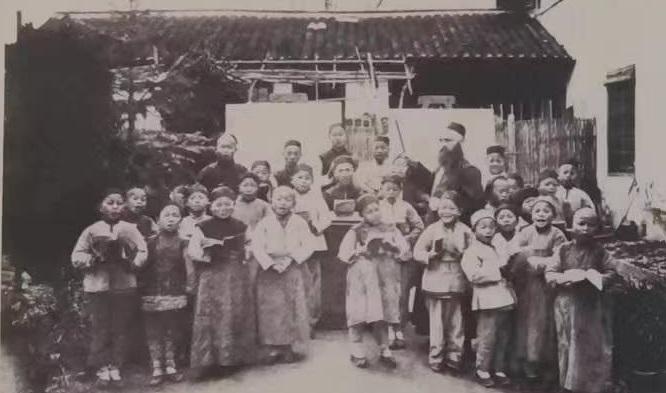When discussing evangelism, many people are familiar with the phrase, life impacts life. A recent visit made me realize that when this sentence is constantly said, the hardships behind it will be diluted repeatedly. The sacrifice of evangelists is ignored, and the arrogance and stubbornness in human bones are underestimated.
Like the labor pains that women must go through to give birth, the birth of every new Christian life is accompanied by blood and sacrifice. This is not easily realized and is often easily forgotten.
In a small county town in Jinzhong, Shanxi Province, several senior people told a story that happened a hundred years ago. In the late Qing Dynasty, a young missionary from England and his family came here to establish a church. He bought 40 mu (equal to 1/6 an acre) of land, built a parsonage, and planned to live there permanently. Two years later, the Boxer Movement broke out, and seven members of the missionary's family were taken to Taiyuan, imprisoned, paraded, and beheaded. Twelve of the native converts were also killed by capital punishment.
One hundred years later, there was not much left of the original 40 mu of land, and the most intact was the parsonage. The whole building can still be seen in the style of that time, with the black-brick walls, the wooden floors, the mahogany stairs, the high ceiling, the fireplace in the bedroom, and the blackened wall by the kitchen boiler. Looking out from the second-floor balcony, you can see the tallest building in the county - a pavilion. Looking through the diaries of missionaries of that era, many knew that the chances of returning to their homeland were slim. The young man who came here with his family and stood on the balcony overlooking the entire county must also be determined to stay here for this life.
In a small room, the senior pastor who showed us around pulled out a board with the word "chapel" in traditional Chinese characters, an arm-length blackboard, and a pedal organ from the Beijing Piano Factory in one corner. There are a lot of antiques of the last century in the house, just as old as the people who come here, some in their late sixties, and some in their early forties. In the old house left by the missionary, one generation left, and the next generation came in. The small blackboard was replaced by the PPT, and the old organ by the piano. But the telling of the story of Jesus Christ is never stopped.
Although the number of believers is small, the lack of pastoral care in the old church has caused many disputes in the past decade. The old pastor who received us came here more than a year ago and was appointed at the age of retirement. The pastor and his wife had to drive for an hour on the highway from home to the church, which they had become accustomed to. Soon after, the church was renovated, another old building took shape with the help of enthusiastic believers, and the workers who renovated the church also believed in Jesus. After a year of teaching bible, about 40 believers began to gather constantly in the church.
Although the funds are insufficient, they still hope to receive brothers and sisters from all over the country and tell the story of the missionary who built the church. The senior pastor is optimistic about the future of the church, "here is where the blood of missionaries has been shed," and the work of spreading the gospel will definitely go well.
According to the records, 241 people (missionaries and their families) were martyred for spreading the gospel in Shanxi Province, and 23,000 martyred local believers were recorded in the journal of the China Inland Mission alone. Now, official statistics show that there are more than 400,000 believers in Shanxi.
The sacrifice of life for spreading the gospel did not occur only a hundred years ago. A believer in Anhui told a story. There was a brother from Luan, who was not a smooth-talker. After the Wenchaun earthquake in 2008, this brother and his wife went to Wenchaun to relieve the people in disaster. Feeling that people's souls needed real comfort and guidance, they stayed there to preach the gospel. Without funds or support from the church, life there was difficult for both of them. Living in a simple shack, they had to face a variety of garbage left by the chicken farmer on the floor, and the ceiling leaked rain, so they often woke up in the morning with wet quilts due to rain. This couple did odd jobs to pay rent and activity expenses for the church. If anyone was willing to listen to the bible, they would seize every opportunity to teach. In this way, he insisted until he fell ill because of a brain tumor. With the encouragement of this couple, churches in Luan began to sponsor ministers. When this brother died, his son took over his father's work and became a pastor in a church in another city.
Without Livingstone, who had walked 30,000 miles into Africa and left his heart in it, there would be no spiritual revival in Africa today. In any geographical territory, be it a continent, a country, a city, or a village, there is always the first Christian who sheds blood and tears for the spread of the gospel. A man's heart is the smallest piece of territory. The first person to preach the gospel in this territory was the missionary of this land.
It seems that evangelism in most cases today is no longer as tragic as in the above stories, and people unconsciously overlook that any gospel seed that is truly planted and rooted must be accompanied by painful sacrifice. To truly become a believer, a person should do more than accept the call, finish the twelve lessons about the Bible, and take the stage to receive a Bible. Why else would it be that nearly a hundred new believers are baptized in the church every year, while fewer and fewer people continue to attend Sunday worship? Missionaries have to live with believers, establish Bible training courses, and keep the seed growing. Meanwhile, true evangelists today must not only spend their minds so that others can hear the gospel, but they also need to devote themselves to prayer, let the Holy Spirit work, and teach Bible lessons, let the truth take root.
Who can say that those cries made to God alone for one's soul are not sacrifices? Since time is life, those believers, volunteers, and pastors who have been involved in church service since their youth are all influencing other lives with their lives. Every believer is a beneficiary of history. Do not underestimate the sacrifices of the pastors who led you and me. Remember the history, honor it, and always be thankful.
- Edited by Abigail Wu, translated by Nicolas Cao












